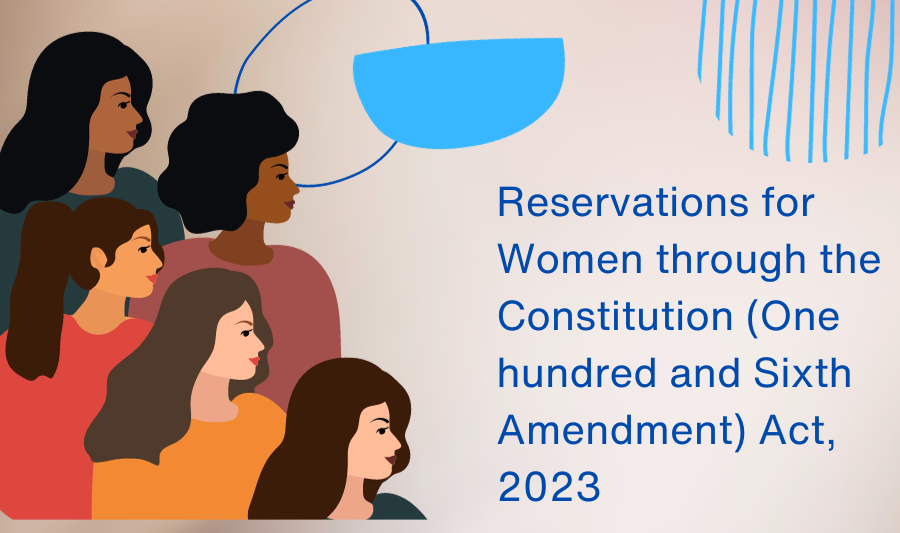Introduction
The Government has notified the Constitution (One hundred and Sixth Amendment) Act, 2023, via the notification in the Gazette of India which received the assent of the President on the 28th September, 2023. This amendment aims to provide 33 percent reservation to women in Lok Sabha and state assemblies.
The 106th amendment Act inserts the following articles to ensure that the benefit has also been extended to the National Capital Territory (NCT) of Delhi and within the seats reserved for Scheduled Castes (SC) and Scheduled Tribes (ST) in the Lok Sabha and state assemblies.
Reservations of seats for women in Legislative Assembly of the National Capital Territory of Delhi:
It inserted the following clauses to Article 239AA (2)(b) which states that the number of seats reserved for scheduled caste in legislative assembly of Delhi and its territorial constituencies shall be governed by law made by Parliament.
Namely:
- Article 239AA (2)(ba): Seats shall be reserved for women as nearly as maybe, in the Legislative Assembly of the National Capital Territory of Delhi.
- (bb) as nearly as maybe, one-third of the seats reserved for the Scheduled Castes in the Legislative Assembly of the National Capital Territory of Delhi shall be reserved for women.
- (bc) as nearly as maybe, one-third of the total number of seats to be filled by direct election in the Legislative Assembly of the National Capital Territory of Delhi (including the number of seats reserved for women belonging to the Scheduled Castes) shall be reserved for women by laws made by Parliament.
Reservation of seats for women in the House of the People:
Article 330 of the Indian Constitution provides for reservation of seats for scheduled caste and scheduled tribes (including Schedule tribes in autonomous districts of Assam) in Lok Sabha.
Article 330A is inserted as part of this amendment stating that:
- Seats shall be reserved for women in the House of the People.
- As nearly as maybe, One-third of the total number of seats reserved under article 330 for Scheduled Castes or the Scheduled Tribes shall be reserved for women belonging to Scheduled Castes or the Scheduled Tribes.
- As nearly as maybe, One-third (including the number of seats reserved for women belonging to the Scheduled Castes and the Scheduled Tribes) of the total number of seats to be filled by direct election to the House of the People shall be reserved for women.
Reservation of seats for women in the Legislative Assemblies of the States:
Article 332 of the Indian Constitution provides for Reservation of seats for Scheduled Castes and Scheduled Tribes in the Legislative Assemblies of the States.
The amendment inserts Article 332A which states that:
- Seats shall be reserved for women as nearly as maybe in the Legislative Assembly of every State.
- As nearly as maybe, One-third of the total number of seats reserved under article 332 shall be reserved for women belonging to the Scheduled Castes or the Scheduled Tribes.
- As nearly as maybe, One-third (including the number of seats reserved for women belonging to the Scheduled Castes and the Scheduled Tribes) of the total number of seats to be filled by direct election in the Legislative Assembly of every State shall be reserved for women.
Additional provisions for reservation of seats for women:
Article 334 of Indian constitution provides that Reservation of seats and special representation to cease after forty years.
The amendment inserts Article 334A which states that:
- Notwithstanding anything in the foregoing provisions of this Part or Part VIII the provisions of the Constitution relating to the reservation of seats for women as nearly as maybe in the House of the People, the Legislative Assembly of a State and the Legislative Assembly of the National Capital Territory of Delhi shall come into effect after an exercise of delimitation is undertaken for this purpose after the relevant figures for the first census taken after commencement of the Constitution (One Hundred and Sixth Amendment) Act, 2023 have been published and shall cease to have effect on the expiration of a period of fifteen years from such commencement.
- Subject to the provisions of articles 239AA, 330A and 332A, seats reserved for women in the House of the People, the Legislative Assembly of a State and the Legislative Assembly of the National Capital Territory of Delhi shall continue till such date as the Parliament may by law determine.
- Rotation of seats reserved for women in the House of the People, the Legislative Assembly of a State and the Legislative Assembly of the National Capital Territory of Delhi shall take effect after each subsequent exercise of delimitation as the Parliament may by law determine.
- Nothing in this article shall affect until the dissolution of the then existing House of the People, Legislative Assembly of a State or the Legislative Assembly of the National Capital Territory of Delhi.
Conclusion
The Amendments made to the Constitution by the Constitution (One Hundred and Sixth Amendment) Act, 2023 shall not affect any representation in the House of the People, the Legislative Assembly of a State or the Legislative Assembly of the National Capital Territory of Delhi until the dissolution as the case may be, in existence at the commencement of the said Act. The objective behind inserting the respective articles is to reserve seats for women and promote opportunities for women based on increasing population and the need to adequately represent women. It is merely an effort to bring equal opportunities for women along with Schedule caste, Schedule Tribes with increasing population.

